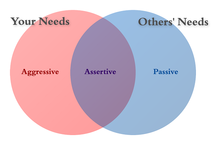|
Parents, older siblings, and enthusiastic aunts and uncles know that a toddler's favorite word is "NO!!" Why does the two- and three-year-old express that sentiment up to 25 times an hour, according to research? She has discovered that it gets attention from others and carries a lot of power. The otherwise powerless toddler is eager to express her preferences and desires, and to tap into a tool for taking charge of her life. Her proud, loud "no's" are early expressions of who she is and what she wants. Although we all go through this phase of  adamant and frequent self assertion as young children, some of us lose touch with it as adults. We find ourselves feeling guilty when we consider saying "no" or setting limits. We find ourselves catering to others, and too frequently putting our needs last. We feel fearful and ineffective when the situation calls for self-assertion. We feel somehow responsible for fulfilling others' wishes or making things easy for them, even if hard for ourselves. We procrastinate making the changes we need to make to improve our lives. For some, self worth is too tied in to being "helpful" or "needed" by others. Some stop recognizing their own needs, and become estranged from themselves. Sadly, some of us know what we want, but we feel we are undeserving. If you can't say "no", you are at risk for negative consequences such as... -overworking -exhaustion/ burnout -neglecting home/family responsibilities -health problems -having too many responsibilities to handle any one effectively -low self-esteem -depression and anxiety -feeling resentful -attracting people who take advantage of us or harm us -feeling unappreciated -missing opportunities -being underpaid -loss of respect by others -feeling a lack of control over one's life -coping by misusing substances and other unhealthy behaviors Do you have a healthy capacity to know when to say "no" and to set limits? How skilled are you at carrying through with those instincts? Are you able to stick to your word, or do you find yourself backing down after asserting yourself? It might be helpful to think about parents and other key adult figures from your childhood. What kinds of behaviors do/did they model related to self-assertion and personal boundaries? When you think of these people, do you see them living mostly healthy, balanced lives with plenty of room for self-care, and respect for others' needs? Or do you see them racked with guilt, feelings of obligation, living the life of a martyr (passive and/or overly self-sacrificing)? Or perhaps they behaved selfishly and exploited others? What's behind difficulties with self-assertion and saying no? Guilt If you feel guilty when you say no, ask yourself what crime you have committed. While being generous with others can feel wonderful at times, you are allowed to pick and choose when and how you give of yourself. There's no need to punish yourself when you decide the answer is no. You may be over-exaggerating your importance in the situation. You may be failing to recognize that people are resourceful and resilient, and your "no" will not destroy them. Fear of negative consequences Many folks get caught up in fears about what consequences they imagine may befall them from saying no. A common fear is that the person will react with hostility. Is this a reasonable fear? Think about how you would respond if the tables were turned. And even the person were to react with anger, are you underestimating your ability to tolerate and withstand their anger? Will the sky fall? One of the pitfalls of a tendency toward people-pleasing is that we are being driven by the belief that we must be some version of liked/admired/acceptable to everyone. Not only is this impossible, but it narrows our self worth disproportionately to what we do, rather than the larger, more complex lens of who we are. What kind of life do you set yourself up for if you base your self worth and lovability on catering to others and sacrificing yourself? Excessive people-pleasing also has the effect of "washing us out" in a way. If we shy away from expressing our unique opinions, needs, desires, and limits, people have a hard time understanding who we are. We simply become a mirror for the other person, or a chameleon who disappears into the background. Assertiveness vs. Aggression People sometimes confuse assertiveness with aggression, when in fact the two are quite different. Aggression can be thought of as an over-emphasis on one's own needs without consideration of, or respect for, others' needs. With this, the aggressive person displays behaviors and body language that convey dominance. Passivity or codependency is the opposite: an over-emphasis on others' needs, while sacrificing oneself. Behaviors and body language may be meek, ingratiating, or deferential. The sweet spot in the middle is where assertiveness lies: balancing one's own needs with others' needs. The style of communication is clear and direct. Tone and body language convey a basic mutual respect for self and others. Childhood Training Some types of family systems fail to teach children how to adequately recognize and advocate for their own needs, and the effects can persist into adulthood. Examples include alcoholic families; physically or emotionally neglectful parents; narcissistic, mentally ill, or otherwise preoccupied parents; and strict authoritarian parents. Some children are criticized as "selfish" when expressing their needs, which often leads to a pattern of compliance and focus on others' needs in order to avoid feeling guilt and shame. Common mistakes made by people who have a hard time saying no "Maybe" Some have a habit of saying "maybe" when they really want to say "no". This is driven by a desire to avoid confrontation or disappointing others. If you know in your heart the answer is "no", don't postpone it - go with the honest answer from the outset. Rushing the decision Sometimes you need time to think when someone makes a request of you. If you have a tendency to say yes right away, and then later question or regret it, you would be wise to train yourself to pause before answering, or to reply "let me get back to you about that." Inconsistency If you say one thing, but turn around and do the other, you teach others that you're not good for your word. If your "no's" somehow frequently become "well, ok's", this invites confusion, manipulation, and loss of respect by others. If someone in your life challenges your decisions, disregards your boundaries, or tries to wear you down (kids, anyone?!), you will need be a broken record. No, no, no. White lies Everyone engages in white lies from time to time, and it's arguable that white lies are reasonable tools for social grace and kindness. But if you rely too heavily on white lies (or flat out lies) to avoid disappointing others, you deny yourself the opportunity to develop the skills of being direct and assertive. White lies also perpetuate the problem in some cases. If someone asks you out for Friday night and you say you're busy, when in truth you don't want to date them, then you set yourself up for ongoing lies and excuses when they ask you out for Saturday, next Wednesday, Thursday, etc. On the flip side, when you are direct and assertive, you show others that you have self-respect and healthy personal boundaries. Defensive/ anxious over-explaining and apologizing When asserting oneself, less is often more. People who are uncomfortable being assertive often have a tendency to give long-winded explanations. This sends a message of insecurity and invites room for negotiation or debate. Apologizing should be avoided, as it sends the message that you did something wrong. Some go the opposite direction and avoid the confrontation altogether, achieving what they want in a passive way through avoidance or "ghosting." This can result in other undesirable consequences down the line. How to be more assertive and learn to say no Pick a Good Role Model Think of someone in your life who you feel exemplifies a healthy and balanced attitude towards responsibility to others and and responsibility to self. If no one comes to mind, start observing others, looking for that role model. Think of how this person operates when you find yourself in situations that require you to assert yourself. Pay Attention to How You Feel When you say yes to something, listen to your body. Do you feel a twinge of any negative feelings like anxiety, irritability, anger, resentment, overwhelm, fatigue? Does the yes feel relatively clear and easy, or is it coming from a place of grudging obligation? Pay attention to internal clues, slow down, and consider your motivations for saying yes. Your body assists you in recognizing when you are acting against your own best interests. Blame External Circumstances Sometimes there are multiple reasons why you want to say no. If one of them is an external circumstance, it's not lying to focus on that reason, as opposed to one that might be more controversial. If you are sick, and you hate your friend's cooking, it may be an act of kindness to focus in your flu as the reason for declining a dinner party invitation. Role Reversal When someone makes frequent or significant requests of you, ask yourself, "Would this person do the same for me if the roles were reversed?" I'm not suggesting we should approach relationships in a tit-for-tat fashion, but if you're prone to being overly accommodating, or you find yourself being used or exploited by others, this can be a helpful exercise to take stock of the extent to which the relationship is balanced or imbalanced. Offer empathy Saying no and setting boundaries can be done with kindness and compassion. Practice paring your "no" with an authentic acknowledgement of their situation: "I know this car repair is super stressful for you. I really wish we had the money to help you out!" Sometimes you can even give a compliment or express gratitude: "I'm going to decline giving a talk at your fundraiser, but I really appreciate your faith in my expertise." Offer an alternative Sometimes you can propose an alternative that you feel good about: "I don't have time to drive you all the way to San Francisco, but I'd be happy to drop you at the ferry terminal on my way to work!" Pick Your Battles Someone absentmindedly cuts in front of you in line, and you're in no hurry. Do you need to assert yourself and take your place back? Nah. If you don't mind waiting, it's fine to let that one go. Pick those moments and situations in which the most important things are at stake, and focus on asserting yourself there. There are many social benefits to being accommodating, generous, flexible, and helpful to others. But if you are over-reliant on these behaviors, and sacrificing your own needs too frequently, you may be setting yourself up for physical and emotional problems, and unsatisfying, imbalanced relationships.
Comments are closed.
|
Blog Categories
All
Archives
May 2024
AuthorMaysie Tift is a licensed Marriage and Family Therapist and Certified Master Hypnotist who sees clients in her San Rafael, CA office and online. |

 RSS Feed
RSS Feed